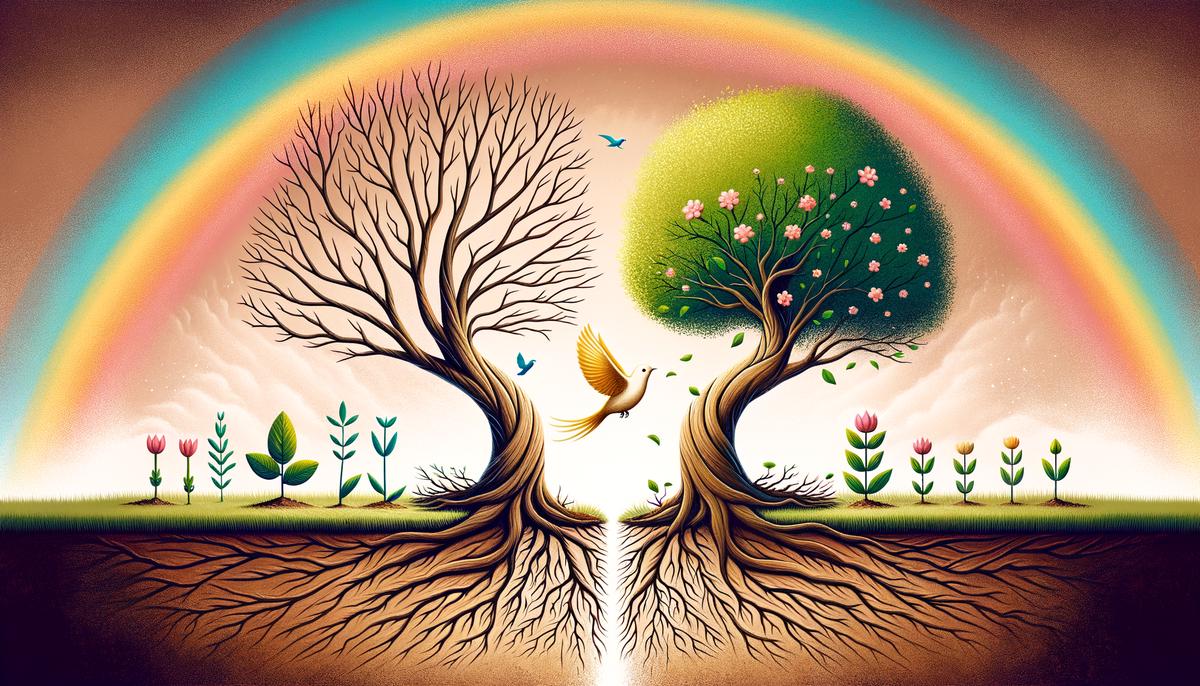Entering into a new relationship after a divorce is a journey that requires careful consideration of one’s emotional state and readiness. It’s about taking stock of where you stand, both personally and emotionally, before stepping forward into the possibility of sharing your life with someone else again. This process involves more than just assessing your readiness; it’s about understanding the importance of healing, growth, and self-discovery.
Emotional Readiness for New Relationships
After a divorce, checking in with yourself to see where you stand emotionally is crucial before dipping your toes back into the dating pool. A good starting point is examining how you handle memories of your past relationship. If thoughts of your ex bring intense pain or anger, it may signal that more healing time is needed.
Personal growth in the aftermath of divorce cannot be overstressed. Reflect on how you’ve changed. Have you discovered new hobbies? Developed new friendships? Such growth can be a green light that you’re moving forward, inch by step.
Recognizing readiness for a new relationship often means gauging your independence. Can you enjoy dinner alone or a solo movie night? Comfort with being alone doesn’t mean loneliness; it reflects a healthy self-reliance that’s crucial before welcoming someone new into your life.
Experts often point to the importance of being able to articulate what went wrong in your previous relationship without feeling overwhelmed. This ability suggests emotional processing which is necessary before starting anew.
Additionally, feeling excitement at the prospect of meeting new people, rather than dread, can be a telling sign that you might be ready to open your heart again. If the idea of sharing your interests, laughter, and time with someone else feels enriching rather than draining, you’re likely heading in the right direction.
Another aspect to consider is whether you’re seeking a relationship from a place of fullness rather than emptiness. If you’re looking to fill a void left by your divorce, it might be beneficial to pause and reevaluate.
Feedback from friends and family can also offer valuable insights. Those close to you can often see changes in your demeanor and attitude that indicate readiness for new relationships.
In essence, assessing emotional readiness after a divorce involves introspection on personal growth, healed wounds, and genuine readiness for new connections. Each journey is subjective, and there’s no universal timeline for when it’s the right time to open up to love again.

Navigating the Dating World
Navigating the world of modern dating brings its own set of opportunities and hurdles, especially for those who have experienced a divorce. Technology and social media have transformed how connections are formed, offering fresh avenues for meeting potential partners that didn’t exist a couple of decades ago. For someone emerging from the aftermath of divorce, this digital landscape can feel like a double-edged sword.
Understanding online dating platforms becomes necessary, as these are the new social arenas for singles. Platforms vary widely in their approach and audience, from those catering to brief encounters to those designed for individuals seeking long-term relationships. For divorced individuals, selecting the right platform can play a crucial role in finding compatible matches who align with their expectations and lifestyle.
The role of transparency about one’s past in forming new relationships cannot be overstated. It’s crucial to share information about one’s divorce at the appropriate time, fostering honesty and trust from the outset. However, oversharing too early in the relationship can burden a budding connection with too much history. Balancing disclosure and discretion becomes a delicate dance.
The stigma surrounding divorce has lessened but still exists in some quarters, making it vital for individuals to approach dating with confidence and a clear understanding of their own worth. This is where insights from dating coaches can be instrumental. They often emphasize the importance of self-esteem, advising those re-entering the dating world to focus on what they bring to a relationship, not just what they’re looking for in a partner.
Personal stories of re-entering the dating scene post-divorce can serve as powerful testimonials to the challenges and joys of dating again. These narratives often touch on the confusion and excitement of navigating new relationships, the thrill of first dates, and the complexity of introducing new partners to one’s children or more extended family.
One significant challenge is managing expectations. After a divorce, desires and needs may have shifted, and individuals often seek qualities in partners that contrast sharply with those of their ex-spouse. This shift necessitates introspection and possibly recalibration of what qualities are truly important in a potential partner.
Online dating introduces divorced individuals to people they might never meet in their regular social circles, broadening the pool of potential partners considerably. Yet, it also requires a skill set for vetting profiles and reading between the lines, as online personas can sometimes mask incompatibilities that only become apparent during face-to-face interactions.
Lastly, maintaining a balance between openness to new experiences and preserving one’s well-being is key. Divorced daters might find themselves in unfamiliar territory, emotionally and socially. Engaging with potential partners from a place of curiosity, resilience, and optimism can uplift the entire experience, turning it from a daunting endeavor into an avenue for growth and unexpected happiness.

Building Trust and Vulnerability
Moving forward, a practical approach towards crafting authentic connections involves mastering the art of communication. Conversing about feelings, hopes, and even daily occurrences can strengthen the bond between partners. It’s about sharing bits of your day or thoughts that popped into your head, making the other person feel included and closer to you.
Setting boundaries is equally pivotal. It’s important to identify personal limits and communicate them clearly to your partner. Boundaries might revolve around personal space, how you prefer to resolve conflicts, or even how much family time is needed. Honoring these boundaries shows respect and fosters trust in the relationship.
Vulnerability is not achieved overnight; it flourishes in consistency. Small acts of trust accumulate over time, gradually deepening the connection. This could be as simple as trusting your partner to manage a small task or confiding in them about a fear of yours. These actions signal that you value and trust your partner’s capabilities and care.
Engage in activities that foster partnership and teamwork. Whether it’s a cooking class, a fitness challenge, or planning a trip together, such endeavors necessitate cooperation and mutual support. They not only create fun memories but also build trust in each other’s ability to contribute and work as a unit.
Learning each other’s love language can vastly improve how you express and receive affection and appreciation. Whether it’s words of affirmation, acts of service, receiving gifts, quality time, or physical touch, understanding and speaking your partner’s love language can open up new levels of depth and satisfaction in your relationship.
Listening actively is crucial. This means fully engaging when your partner is speaking, without planning your response while they’re talking. It demonstrates that you value their thoughts and feelings, reinforcing trust and closeness.
It’s vital to approach new relationships with honesty about your past, without letting it overshadow the potential of your future together. Share lessons learned from previous experiences, how they’ve shaped you, and how you envision your future. This practice not only displays maturity and self-awareness but invites your partner to understand and accept your journey.
Seeking professional guidance or couples therapy can be beneficial, even if you’re not facing significant issues. Therapy can offer strategies for healthy communication, resolving conflicts, and understanding each other’s emotional landscapes better. It’s about laying strong foundations and showing commitment to the relationship’s health.
Remember, rebuilding trust and vulnerability after a divorce is a journey filled with learning and growth. Celebrate small victories along the way and keep the lines of communication open. Embrace the experience of connecting deeply with someone new, knowing that each step forward is a step towards a fulfilling relationship.

Blending Families
When children are involved in blending families, introducing them gradually to new partners ensures a smoother transition. Initial meetings should be in neutral, enjoyable settings to reduce pressure and let relationships develop organically. Talking to kids about their feelings towards the new family setup is critical. Encourage open communication, allowing them to express fears, concerns, and hopes.
Respect for the children’s relationship with their other biological parent is paramount. Ensure the new partner understands the importance of this bond and does not attempt to replace the biological parent but becomes an additional support figure in the child’s life. Establishing new family traditions can help blend the families, creating shared memories and experiences that strengthen bonds. However, it’s also important to maintain some existing routines to provide stability for the children.
Timing is crucial. Introducing a new partner too soon can cause confusion or resentment. Wait until the relationship is serious and stable before making introductions, and ensure both adults are committed to blending their families successfully. Develop a co-parenting strategy with the children’s other parent. Effective co-parenting promotes stability and shows children that they remain the top priority despite the new family dynamics.
Respect and patience are the foundation of successful step-relationships. Step-parents and step-siblings might not immediately bond, and that’s okay. Allow relationships to evolve at their own pace without forcing intimacy. Setting clear boundaries is necessary for all family members. Discuss roles, responsibilities, rules, and expectations openly to avoid misunderstandings. This discussion should involve the children, giving them a say in the new family structure and rules.
Celebrate individuality within the blended family. Acknowledge and respect that each member comes with their unique personality, experiences, and needs. Encourage each family member to share their traditions, interests, and ideas, enhancing mutual respect and appreciation. Consistency in discipline across both biological and step-children is essential to avoid feelings of unfair treatment. Parents and step-parents need to agree on household rules and discipline methods, presenting a united front.
Engaging in family counseling can provide a space for all members to voice their feelings and concerns safely. It can also offer strategies for navigating the complexities of blended family life while building solid familial foundations. Sharing stories of other successfully blended families can offer encouragement and prove that, with time and effort, new family dynamics can work well. Remember, successful blending doesn’t happen overnight. It requires patience, commitment, and continuous effort from all parties involved to foster a cohesive and harmonious new family unit.
By focusing on these strategies and considerations, individuals can navigate the complexities of blending families post-divorce, paving the way for a stable, supportive, and loving home environment for everyone involved.

Maintaining Independence in a New Relationship
Maintaining a sense of self in a new relationship post-divorce involves prioritizing personal space and time. This personal space allows for the continuation of individual interests that were developed during the period of being single. Engaging in hobbies and interests separate from those of the new partner encourages personal fulfillment and decreases the risk of losing oneself in the relationship. Creating a balance between couple time and me-time is crucial for a healthy partnership.
Establishing personal goals outside the relationship is another key aspect of maintaining independence. Whether these goals are related to career aspirations, fitness achievements, or personal development projects, pursuing them fosters a sense of accomplishment and self-worth. This, in turn, enhances the overall quality of the new relationship by bringing two self-sufficient individuals together.
Inviting the new partner to support personal goals without sacrificing their autonomy creates a dynamic of mutual respect and admiration within the relationship. It’s essential that each partner cheers for the other’s successes while maintaining their distinctive paths. This support system builds a stronger bond, with each individual feeling valued for their achievements.
Setting boundaries is vital in any relationship but more so in one that follows a significant life change such as divorce. Clearly communicating boundaries concerning time, space, and emotional availability helps prevent feelings of overwhelm or loss of self. It’s equally important for these boundaries to be respected by the new partner to ensure a healthy dynamic that allows both individuals to thrive.
Independence within a relationship can also prevent the development of codependency, a common concern for those entering a new relationship after divorce. By fostering self-reliance and encouraging the same in their partner, individuals promote a partnership based on want rather than need. This approach-togetherness based on desire rather than dependence creates a more vibrant and sustainable connection.
Participating in separate social circles and activities can further strengthen one’s independence in a new relationship. Maintaining friendships and interests outside of the relationship ensures a well-rounded social life and reduces pressure on the partnership to fulfill all social needs. Encouraging each other to enjoy these independent social interactions can foster trust and provide exciting experiences to share and discuss.
Incorporating solo travel or retreats can serve as an effective method for maintaining one’s independence. These experiences allow individuals to reconnect with themselves, explore their interests, and return to the relationship rejuvenated. Solo adventures represent a profound trust and confidence in the relationship, showcasing that time apart can enhance the connection.
Adopting an approach of mutual growth where both partners inspire each other to be their best selves without overshadowing their individuality is essential. This growth mindset encourages continuous personal and couple development, seamlessly blending independence with unity. Keeping the relationship expectations flexible, allowing room for individual evolution, ensures that the partnership can adapt and flourish over time.
In conclusion, nurturing independence in a new relationship post-divorce is a multifaceted endeavor that requires conscious effort, clear communication, and mutual respect. By prioritizing individual growth alongside the growth of the relationship, partners can build a fulfilling and enduring connection that celebrates their unique selves as much as their togetherness.

In conclusion, the cornerstone of moving forward into a new relationship post-divorce is recognizing and embracing your journey of personal growth and emotional readiness. By prioritizing this self-awareness, individuals can foster a connection that is not only fulfilling but also supportive of both partners’ paths towards healing and happiness.







